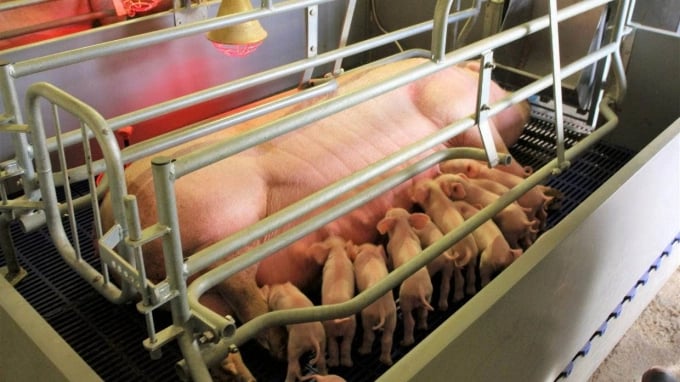November 25, 2025 | 13:37 GMT +7
November 25, 2025 | 13:37 GMT +7
Hotline: 0913.378.918
November 25, 2025 | 13:37 GMT +7
Hotline: 0913.378.918

Illustrative photo.
IFC will invest as many as VND 1 trillion (USD 43 million) in the form of a seven-year bond, which will enable GREENFEED to expand its pig farming and production operations. The company's pork production is expected to increase by 750,000 pigs by 2023. This means that the company will supply more than 125,000 tons of pork yearly, and according to IFC's estimation, it will be enough to provide about an additional 385,000 consumers.
Pork is the main and essential protein supply source for Vietnamese consumers, accounting for 70% of total meat consumption of the whole country. Around half of the pork provided by the small-scale farms are meeting low biosecurity standards. Over the past two years, the spread of African Swine Fever (ASF)—a fatal and highly contagious viral disease affecting pigs globally dramatically reduced supply, causing a sharp rise in pork prices. Live hog prices are now about 50 percent higher than pre-ASF prices, after having doubled during 2019–2020.
Contributing to realizing the goal of 70% of Vietnam's pork production being produced on modern industrial farms with higher microbiological safety standards, IFC's investment will help address the situation of a severe shortage of pork supply and drastic price fluctuations due to African swine fever.
The IFC grant will help GREENFEED expand its pig production capacity, providing safe and traceable pork to meet the growing demand for food of animal origin in Vietnam.
Ly Anh Dung, Chairman of the Board of Directors of GREENFEED Vietnam Corporation, said: “IFC's support will also help us continue towards becoming a leader in the meat food value chain. pigs in Vietnam and around the world, while adhering to industry best practices in Vietnam and globally.”
Sustainable farming practices and biosecurity will help improve the resilience of the Vietnamese livestock industry, ensuring a stable supply of essential animal protein products.
Kyle Kelhofer, IFC Country Manager for Vietnam, Cambodia, and Laos said: “By supporting companies like GREENFEED, we are promoting more efficient and sustainable growth of private businesses. Vietnamese people in the supply chain of agricultural products. This will help strengthen competitiveness, push the livestock industry to continue its transformation towards modernization and adoption of best production practices.”
The International Finance Corporation (IFC) is an organization dedicated to helping the private sector in developing countries. IFC provides investment and wealth management services to encourage the growth of private enterprises in countries that lack the infrastructure or liquidity to receive financial financing.
IFC was established in 1956 as part of the World Bank, focusing on poverty alleviation and job creation through the development of private enterprise. The IFC also ensures that private businesses in developing countries have access to markets and funding.
The IFC's most recent goals include sustainable agriculture, expanding access to microfinance, improving infrastructure, as well as policies on climate, health, and education. IFC is governed by 184 member countries and is headquartered in Washington.

(VAN) The information was shared at the seminar 'Urban Agriculture - Solutions for Developing Green Spaces,' organized by the Kinh te & Do thi Newspaper and the Biotechnology Center of Ho Chi Minh City.
/2025/11/19/4141-2-132831_216.jpg)
(VAN) One of Japfa's outstanding solutions is implementing digital transformation and artificial intelligence (AI) to optimize operations, enhance productivity, and advance sustainable development.
/2025/11/19/4847-1-093540_448.jpg)
(VAN) The Gia Lai Provincial People’s Committee had a working session with the delegation of the U.S. Department of Agriculture, the State of Idaho, and representatives of the State's leading enterprises.

(VAN) Ca Mau has a sufficient foundation to become a strong regional aquaculture center, where production integrates the economy, the environment, and the lives of the people.

(VAN) SEIKI Group envisions itself as a pioneer in the ‘dual transformation’ of digital technology and green industry, standing alongside the Government and Vietnamese businesses in their pursuit of sustainable development.

(VAN) The VNGEONET network affirms Viet Nam's progress in mastering digital space, providing a precise positioning data platform to serve socioeconomic development.
/2025/11/14/3247-1-184556_35.jpg)
(VAN) Thai Nguyen is methodically implementing digital transformation in the livestock sector, laying the foundation for a modern, transparent, and sustainable agriculture.